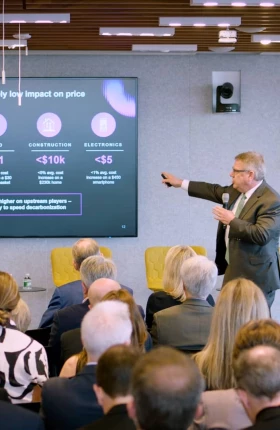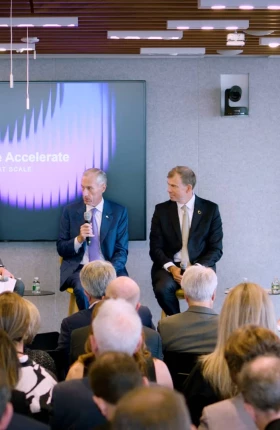COP28は地球にとって重要な瞬間となるでしょう。BCGの気候関連エキスパートは、気候変動という差し迫った課題に対する革新的なソリューションに向けた連携と取り組みを強化するために、世界各地のリーダーと協働します。
Insights from COP29 and Beyond
At BCG, we remain committed to partnering with the most impactful institutions around the globe to drive impact on the issues that will be front and center at COP29. Our expertise includes:
Climate Finance — BCG is committed to helping organizations unlock climate financing and innovation by mobilizing funding across the investment and venture ecosystem.
Climate Finance — BCG is committed to helping organizations unlock climate financing and innovation by mobilizing funding across the investment and venture ecosystem.

Article
2025年3月12日
The investments necessary to mitigate and adapt to climate change are far less than the cost of inaction—11% to 27% of global GDP by 2100.

Our white paper—a collaboration with Howden and the conference’s High-Level Champions—illustrates the industry’s role through real-world examples in financial risk reduction, capital mobilization, operational performance optimization, and policy implementation.

Article
2024年11月12日
Companies need a holistic strategy to coordinate requirements, clearly define responsibilities, and effectively use advanced technologies.

Article
2024年10月7日
Optimizing networks requires balancing five key objectives that address traditional issues of cost, service, and growth as well as a new focus on sustainability and resilience.
Sustainable Transformation and Green Growth — We help leaders build more sustainable organizations and deliver greener impact. Our experts help legacy companies drive innovation at the core, ensuring that they are able to deliver financial returns and positive societal impact. We also work closely with emerging businesses to scale innovation and achieve lasting competitive advantage.

Article
2024年11月11日
There’s a major value-creation opportunity in building green businesses, but many complexities stand in the way. Here’s how CEOs can seize the opportunity.
Video
2024年6月20日
BCG’s Green Growth Accelerator partners with clients across industries and sectors—including energy, textiles, fast-moving consumer goods, transportation, and more—to drive climate innovation, unlock opportunities for growth, generate new revenue streams, and create lasting competitive advantage.

Report
2024年10月23日
This year’s report reflects data from over 6,000 PE-backed companies, offering new insights on how sustainability in the private markets has evolved over the last year.
The Sustainable Advantage: Insights on Creating Competitive Advantage Through Sustainability
Decarbonization and the Energy Transition — BCG combines a deep expertise in energy, climate, and
social impact to bring innovative and inclusive solutions to the energy transition. We work closely with clients to lower their emissions footprint, ensuring that they are ready to build—and operate in—a more sustainable world.

Article
2024年11月13日
A clear framework outlines mechanisms and pathways that unlock more capital to ensure the climate transition is not only green but also equitable.

Article
2024年11月4日
Companies that abate their methane emissions early can gain a significant competitive advantage. We’ve identified six steps that can ensure the abatement journey is a success.

Article
2024年9月30日
These aren’t traditional capital projects—so, to succeed, companies need to deploy new collaborative approaches, capabilities, and tools.

Article
2024年9月19日
Four major barriers stand between emerging climate technologies and adoption at scale. Here’s how earlier pioneering technologies—wind, CCGT, renewables, LNG, and solar—overcame them.
AI, Technology, and Climate Impact — While
emerging technologies offer corporations and governments a much-needed edge in the fight against climate change, because of their energy intensity, they must be deployed thoughtfully. Our experts help organizations harness
AI, climatech, and other powerful capabilities efficiently and sustainably, without exacerbating the issues they are trying to solve. Used strategically, these tools will help our most important institutions reduce emissions, speed the energy transition, and unlock value.

Article
2024年9月9日
To make AI and other transformative technologies broadly accessible and avoid missteps, the private sector must double down on collaboration.

Slideshow
2024年9月17日
Our fourth annual survey on carbon emissions found that the overall pace of decarbonization has slowed—but that leaders are realizing significant financial value.

Using an integrated approach and granular understanding of customer needs, companies can harness deep tech and radical innovation to reinvent products that overcome barriers to sustainable choices.

Article
2024年11月8日
AI development is fueling a surge in energy demand, threatening net zero commitments. By working together, CEOs across industries can keep both transformations on track.
Our Latest Thinking from BCG Climate Experts
Highlights from UNGA & NY Climate Week 2024
Video
2024年9月27日
A Deep Dive on the Costs of Decarbonization
Ultimately, decarbonized products won’t cost consumers a big premium. But getting there won’t be cheap or easy, explains BCG’s Rich Lesser.
Video
2024年9月27日
What Will Enable Companies to Move Faster on Climate?
Dow’s Jim Fitterling discusses the role of new markets, collaboration, and innovation in driving technological advances and speeding up climate action.
Video
2024年9月26日
Profits with Purpose
Alex Amouyel discusses how Newman's Own Foundation directs all profits to support children’s programs, donating to initiatives that nourish and uplift kids facing adversity.
Video
2024年11月4日
Partnering with the Private Sector to Meet Humanitarian Needs
The private sector’s scale and reach make it a valued partner in disaster response and other humanitarian efforts, says BCG’s David Young.
BCGのCOP28代表団













